Canon 20D: Raising the Bar for Prosumer Digital SLRs
by Stephen Caston on November 11, 2004 12:05 AM EST- Posted in
- Digital Camera
Resolving Fine Lines
For our resolution test, we reset the cameras to their default settings and then captured the chart in both JPEG/Fine and RAW modes. The cameras were set to Aperture priority (f/11). A Canon 50mm Macro lens was used on both cameras. For more information, refer to our Testing Procedures page. The RAW images have been converted to high quality JPEG files using Photoshop. We did not do any post-processing other than adjusting the EV (exposure value) when necessary. The original CRW/2 files are also available for download. Below the downloadable charts are 200% crops of the test. When reading this chart (ISO12233), the numbers represent lines per picture height (LPH). For example, the number 15 would represent 1,500 lph.| 20D | 10D | |
| JPEG/Fine | Download | Download |
| RAW (JPEG) | Download | Download |
| RAW (original) | Download WARNING: 8MB |
Download WARNING: 6MB |
| 20D JPEG (+1.3 EV) |
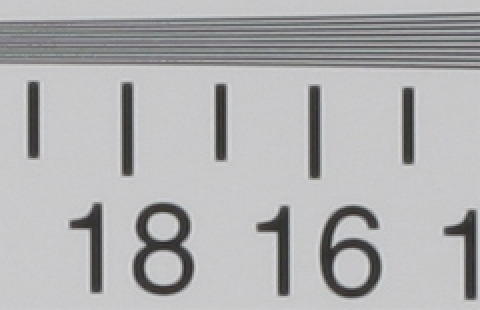 |
| 20D RAW (+1.3 EV) |
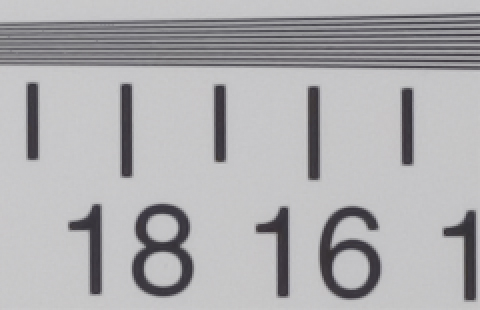 |
| 10D JPEG (+1.5 EV) |
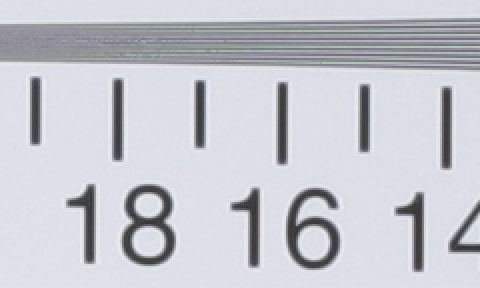 |
| 10D RAW (+2.0 EV) |
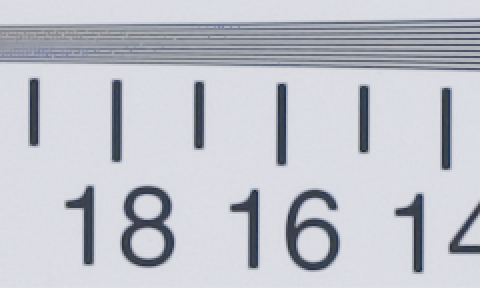 |
| 20D JPEG (+1.3 EV) |
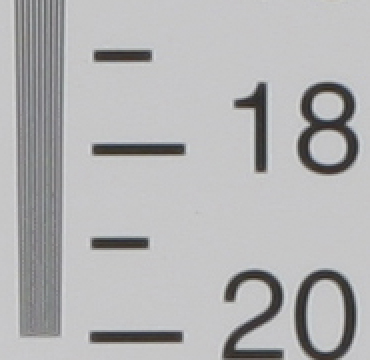 |
| 20D RAW (+1.3 EV) |
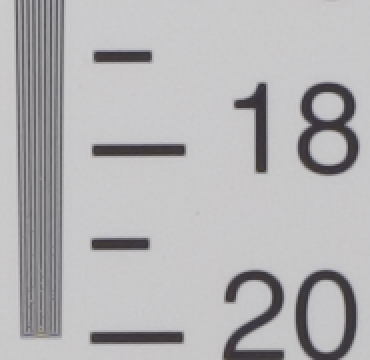 |
| 10D JPEG (+1.5 EV) |
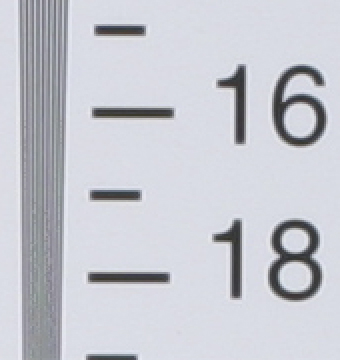 |
| 10D RAW (+2.0 EV) |
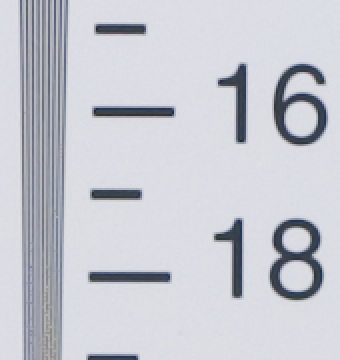 |
Our resolution chart shows that the 20D is able to resolve fine lines out to 1,800 LPH (lines per picture height) in RAW mode. The image loses detail as the lines become finer, but the chart ends before extinction occurs. In JPEG/Fine mode, the 20D loses a small amount of resolution and produces fine lines out to 1,700 LPH. Again, extinction does not occur because of the limit of the chart.
In RAW mode, the 10D is able to capture fine detail out to 1,600 LPH. Extinction does not quite occur by the end of the chart, but it is close. In JPEG/Fine mode, the 10D can produce distinct lines up to 1,500 LPH. What this test shows is that the 20D is able to capture as much as 2,000 LPH more than the 10D.










14 Comments
View All Comments
shuttleboi - Monday, November 15, 2004 - link
What exactly is the point of these camera reviews? As I wrote several months ago, Anandtech is a gadget/hardware site, not a photography site. If you want to reach the photography community (like the rich folk who hang around DPReview.com, spending $1000 a month on lenses, and are ready to click on lots of advertisers' banners), you should do something novel. I suggested reviewing portable photo storage devices (e.g. the Epson P-2000, Archos AV-480, and Nikon ), but nobody listened to me. Suit yourself. As soon as you review any of these gadgets, you will find yourself on DPReview.com, gizmodo.com, and other popular sites. But don't listen to me, I'm just a yuppie male, age 28-40, making a good salary; it's not like your advertisers care about my demographic or anything.Joony - Friday, November 12, 2004 - link
I love my 20D, check out my photogallery,http://www.pbase.com/joony
Gatak - Thursday, November 11, 2004 - link
You may also want to look at the DCRAW - Digital Camera RAW. It is a open source program for reading RAW files from most camera RAW files.DCRAW vs. Canon D60: http://www.aim-dtp.net/aim/digicam/dcraw/
DCRAW vs. Canon 10D: http://www.insflug.org/raw/analysis/dcrawvsfvu/
DCRAW source: http://www.cybercom.net/~dcoffin/dcraw/
Windows binary: http://home.arcor.de/benjamin_lebsanft/
stephencaston - Thursday, November 11, 2004 - link
Woodaddy, thanks for your comments. A Canon 50mm f/2.5 Macro lens was used for all the tests except on page 11 (where each picture lists the lens used beneath the thumbnail). I've also amended the other image quality pages to indicate the use of the 50mm. Sorry for this oversight.WooDaddy - Thursday, November 11, 2004 - link
I missed something critical here. Let me know if it was posted. What lens are you using? Since DSLRs have interchangable lenses, the image quality is directly related to the lens used. If not listed, you really want to say that for reference in you image quality tests.#8, #3 I've picked on Stephen when he first got started on his reviews. He's getting better and IMO he's doing a great job. Now mind you, dpreview is for photogs/techies with an emphasis on photogs. AT is the converse; techies/photogs. I would consider ease of use and image quality and control to be a focus in a review at dpreview. Technical features would be the focus at AT....
Personally, I'm a photog more so than a techie camera guy. I'm doing quite well with my Nikon FE2 manual camera (with Acer 2740s film scanner) and Minolta G400 backup.
AtaStrumf - Thursday, November 11, 2004 - link
Wau, this thing makes some great pics! Way too expensive though.Gatak - Thursday, November 11, 2004 - link
#3 Yes dpreview has many good articles. But I think this is a good start anyway. Dpreview is very technical and doesn't really provide much explanation of technical stuff. This is something I think Anandtech could advance in =) It is possible to have technical depth and yet have good, easy to understand explanations.ProviaFan - Thursday, November 11, 2004 - link
#4 - that's why we have the term "prosumer". It's (the 20D) better than consumer, which would be the digital rebel, but it's not in the league of 1D Mark II (even though it has the same resolution, the speed and build quality don't compare) or 1Ds - which are professional.stephencaston - Thursday, November 11, 2004 - link
#4, The 20D is often referred to as a Prosumer camera. Among the reasons are price, 1.6x cropping factor, sealing, built-in flash, and _optional_ battery grip.The 20D is aimed at amateur photographers looking to replace/supplement their existing film SLR or for those looking to upgrade from a non-SLR camera. I've also heard of pros buying 10D and 20D bodies as backup cameras. I don't think it would be fair to the 1D line to call the 20D a professional camera. It is very nice, but not quite pro ;-)
sjprg - Thursday, November 11, 2004 - link
Nice article, I use both a 10D and a 20D and would like to see some ACR tests added to the CPU processing tests besides the emphasis on games to assist us in selecting the best hardware for processing digital images. One of the test that could be used is the Tom Fors ACR calibrator beta 3.http://fors.net/scripts/ACR-Calibrator/